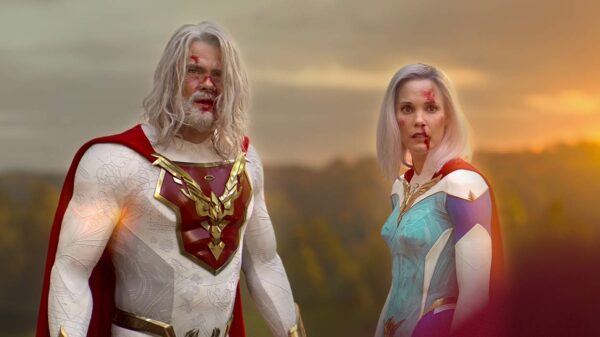Jupiter’s Legacy Volume 1 brings us (another) multi-generational superhero series with (another) deconstruction of the genre. Sadly it fails to excel at either
Despite effects, sets, and a cast doing their best, Netflix’s Jupiter’s Legacy fails to concentrate on anything in particular, resulting in eight episodes of slow-moving character introductions and simplistic moralising. We’ll explain.
What’s Jupiter’s Legacy about?
There is a collection of superheroes known as The Union, led by Utopian. They get the bad guys and lock them away, doing good and leading by example. But they’re not getting any younger and youth today isn’t what it used to be (it never is) and they want to be heroes in a modern way (whatever that means). Children come into inevitable conflict with their parents, meanwhile the super-powered bad guys have their own agendas, and it doesn’t involve respecting the Code of the Union. Cue lots of costumer capers, flying, CGI and special powers.
What doesn’t work?
We may be spoiled by the vast range of great content available, but Jupiter’s Legacy fails to raise its head very far above the crowd, at least in this first volume. We’ve seen better treatments of the key ideas recently; Young vs old in Invincible and superheroes in a realistic world in The Boys.
The series tries to ground an ageing group of long-lived superheroes in a world that no longer shares their values, if it ever did. After ninety years, Utopian (Sheldon Sampson played by Josh Duhamel) starts the series a one-dimensional (and painfully slow) god-fearing, do right (i.e. what I say) leader of the Union. He’s only interesting to watch as the series moves forward at the same time moving backward to show the quest he undertook in 1929, dragging a random-seeming group of people to a mysterious island. Here they get their superpowers (for no clear reason, and reminiscent of The Champions on steroids) and the world also (eventually) gets super-powered villains and super-powered offspring.
So many questions…
The current day is all drugs, music, sex and slaughter, while the past has more realistic people on a quest. What happened in between? We get hints, but why does Sheldon’s wife Grace (Lesley Bibb) aka Lady Liberty take ninety years to begin to question her husband’s frankly dictatorial position? How did that world become this world? Why should we care about any of the characters? Are we interested in why Sheldon fell out with best-friend George (Matt Lanter?)
The show sometimes wants to focus on Brandon Sampson (the son played by Andrew Horton) but prefers watching the car-crash (literally) life of drug-using, rebellious daughter Chloe (Elena Kampouris, who is excellent). There’s some sort of mystery in the modern world but it fails to land until near the end of this run. By which point we suspect many may have given up.
There’s more promised and the original comic books are widely praised, so let’s hope Volume Two finds its feet.
![]()

